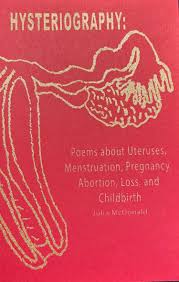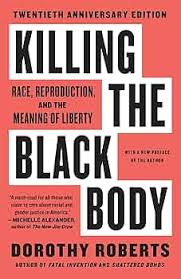It’s no secret that much of our worldview is shaped by the information we consume, and more specifically, the narratives we observe.
At the personal level, the stories we encounter deepen our understanding of how existing structures benefit or harm our communities. As narratives spread, they offer motivation to maintain existing systems or challenge them and create something new. Books from those on the front lines of social change are an underutilized resource that play an essential role in challenging false framings of abortion, substance use, HIV care, and other stigmatized forms of care. A thoughtfully crafted, Reproductive Justice-informed reading list offers a unique opportunity to expand our knowledge of the overlap between systems of care and correct misconceptions with expert guidance, at our own pace.
Provide’s Executive Director, Fatimah Gifford, says that the power to take us beyond “where we are” toward “where we can be” is the daydreaming required to make wide-scale change for entire societies.
“Books don’t just reflect where we are—they help us see where we must go,” she says. “They challenge us to confront the violence of indifference and the urgency of truth-telling. And above all, they offer a collective refusal to give up on dignity, agency, and justice.”
In that spirit, we’re sharing books and authors that align with our vision of an equitable sexual and reproductive health system that cares for the whole person with dignity and respect.
Here are seven staff recommendations for Reproductive Justice titles every healthcare and social service professional needs on their summer reading list.
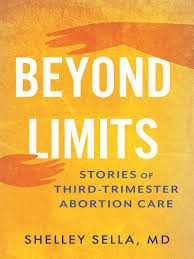
Beyond Limits: Stories of Third-Trimester Abortion Care
By Shelley Sella, MD
Why we recommend this book: Dr. Sella pulls us beyond the limits of sanitized narratives to bear witness to the complexity and compassion of third-trimester care.
Book description:Within both the anti-abortion and pro-choice movements, third-trimester abortion is often stigmatized and misunderstood. For 20 years, Dr. Shelley Sella saw patients whose diverse backgrounds and circumstances led them to the same difficult decision: to end their pregnancies. Beyond Limits is not just a testament to a standard of care grounded in competence, compassion, and sensitivity. It is also a call for a paradigm shift that moves beyond Dobbs, beyond Roe, beyond limits to provide care. And it is a tribute to the real people whose hearts, reasons, and stories are more complex than politicized conversations about abortion lead us to believe.
Hysteriography: Poems about Uteruses, Menstruation, Pregnancy, Abortion, Loss, and Childbirth
By Julia McDonald, DO, MPH
Why we recommend this book: Dr. McDonald’s poetry insists that we feel—not just think—about our bodies, our grief, and our power.
Book description: Hysteriography is a collection of listening poems and origin stories, birthed from intimate conversations and bound in a hand-screen-printed cover (by Little Chair Printing). In conjunction with The Good Listening Project, physician poet Julia McDonald elevates lived uterus experiences with lyrical language and vivid imagery while spanning an emotional spectrum from heartbreak to grrrl power humor. Arriving into a divided and violent world at a critical time for people with uteruses and those who love them, Hysteriography is a perfect antidote for these times: applicable, timely, and devastatingly beautiful.
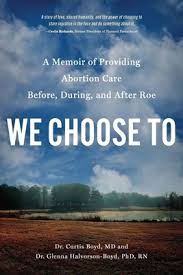
We Choose To: A Memoir of Providing Abortion Care Before, During, and After Roe
By Dr. Curtis Boyd, MD & Dr. Glenna Halvorson-Boyd, PhD, RN
Why we recommend this book:Drs. Boyd and Halvorson-Boyd remind us that this work is not new—and neither is the opposition—but that our deepest convictions, when grounded in care and community, can endure across decades of struggle.
Book description: In this deeply personal account, Dr. Curtis Boyd and Dr. Glenna Halvorson-Boyd reflect on their lives in abortion care, from the childhood experiences that shaped their paths to the Supreme Court decision that forced the closure of their Dallas clinic.
We Choose To is the story of [their] partnership, and the staff and patients that have shaped the history of modern abortion. In these pages, Curtis and Glenna share their holistic, morally rooted approach to their work. Led by a desire to empower patients, they advance abortion and mental health care further than ever even as they find themselves at the center of a controversial new issue in American life.
Killing the Black Body: Race, Reproduction, and the Meaning of Liberty
By Dorothy Roberts
Why we recommend this book:Despite being decades old, Roberts offers an overview of the history of reproductive oppression and offers a vision of what reproductive liberty could look like that still feels current today.
Book description: In 1997, this groundbreaking book made a powerful entrance into the national conversation on race. In a media landscape dominated by racially biased images of welfare queens and crack babies, Killing the Black Body exposed America’s systemic abuse of Black women’s bodies. From slave masters’ economic stake in bonded women’s fertility to government programs that coerced thousands of poor Black women into being sterilized as late as the 1970s, these abuses pointed to the degradation of Black motherhood—and the exclusion of Black women’s reproductive needs in mainstream feminist and civil rights agendas.
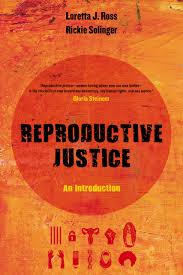
Reproductive Justice: An Introduction
By Loretta Ross & Rickie Solinger
Why we recommend this book: In Reproductive Justice: An Introduction, Ross & Solinger help readers connect the dots between reproductive justice and reproductive rights while describing how reproductive justice is different from pro-choice and anti-abortion debates.
Book description: Reproductive Justice is a first-of-its-kind primer that provides a comprehensive yet succinct description of the field. Written by two legendary scholar-activists, Reproductive Justice introduces students to an intersectional analysis of race, class, and gender politics. Loretta J. Ross and Rickie Solinger put the lives and lived experience of women of color at the center of the book and use a human rights analysis to show how the discussion around reproductive justice differs significantly from the pro-choice/anti-abortion debates that have long dominated the headlines and mainstream political conflict.
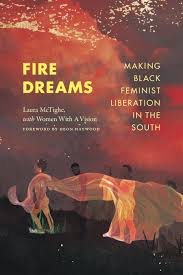
Fire Dreams: Making Black Feminist Liberation in the South
Co-authored by Laura McTighe and the New Orleans-based collective Women With A Vision (WWAV)
Why we recommend this book: Fire Dreams underscores the importance of community-led initiatives and the refusal to accept oppressive systems. Deon Haywood talks about the work of WWAV not only from a resilience standpoint but also how they would not be silenced or erased. Their defiance and hope serves as an inspiration and guide for me and a reminder for to remain committed to fighting for Black liberation.
Book description: For thirty-five years, the New Orleans-based Black feminist collective Women With A Vision (WWAV) has fought for the liberation of their communities through reproductive justice, harm reduction, abolition feminism, racial justice, and sex workers’ rights. In 2012, shortly after one of WWAV’s biggest organizing victories, arsonists firebombed and destroyed their headquarters. Fire Dreams is an innovative collaboration between WWAV and Laura McTighe, who work in community to build a social movement ethnography of the organization’s post-arson rebirth. Rooting WWAV in the geography of the South and the living history of generations of Black feminist thinkers, McTighe and WWAV weave together stories from their founders’ pioneering work during the Black HIV/AIDS crisis in the 1980s and their groundbreaking organizing to end criminalization in the aftermath of Hurricane Katrina—with other movements for liberation as accomplices.
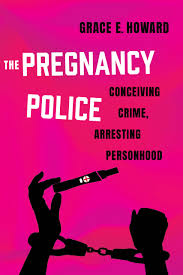
The Pregnancy Police: Conceiving Crime, Arresting Personhood
By Grace E. Howard
Why we recommend this book: In The Pregnancy Police: Conceiving Crime, Arresting Personhood, Howard lays bare how criminalization isn’t new—it’s just expanding, often at the intersection of gender, race, and class.
Book description: Decades before the overturning of Roe v. Wade, pregnant people faced arrest and prosecution for supposed crimes against the fertilized eggs, embryos, and fetuses they gestated. The Pregnancy Police investigates the legal arguments undergirding these prosecutions and sheds much-needed light on the networks of health-care providers, social workers, and legal personnel participating in this ongoing surveillance and punishment of pregnant people.
Drawing on detailed analyses of legislation, statements from prosecutors and law enforcement, and records from over a thousand arrest cases, Grace E. Howard traces the long history of state attempts to regulate and control people who have the capacity for pregnancy–from the early twentieth century’s white supremacist eugenics to the end of Roe and the ever-increasing criminalization of abortion across the United States.

